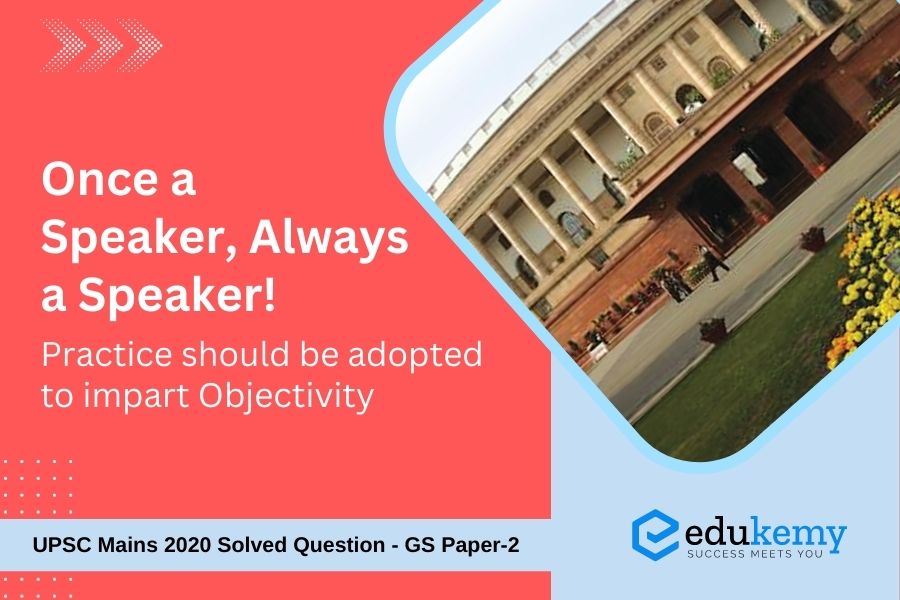The notion of “Once a Speaker, Always a Speaker” reflects an intriguing proposition in the context of the Lok Sabha, the lower house of India’s Parliament. Adopting such a practice could potentially infuse a sense of objectivity into the office of the Speaker, as it implies a continuity of the Speaker’s role beyond their term. This continuity might foster a non-partisan approach, ensuring that the Speaker remains detached from political affiliations and concentrates on upholding the principles of democracy and maintaining order in the house. However, while this concept may contribute to a more impartial Speaker, it also raises concerns about the concentration of power and the need for fresh perspectives in parliamentary leadership. The potential implication for the robust functioning of parliamentary business in India lies in striking a balance between continuity and the introduction of new leadership. It is essential to weigh the benefits of experience against the advantages of introducing diverse perspectives to maintain a healthy and dynamic democratic system.
UPSC Mains General Studies Paper – 2 Mains 2020
Parliament and State Legislatures – Structure, Functioning, Conduct of Business, Powers & Privileges and Issues arising out of these
UPSC Mains Civil Services IAS Exam Question Paper – 2020
Contents
- 1 Structure of the Question
- 2 Answer
- 3 Conclusion
- 4 Frequently Asked Questions (FAQs)
- 4.1 1. Is the concept of “Once a Speaker, Always a Speaker” a viable approach for ensuring objectivity in the Lok Sabha?
- 4.2 2. How does the concept of “Once a Speaker, Always a Speaker” impact the democratic principles of rotation and diversity in leadership?
- 4.3 3. Are there historical precedents or global examples where a similar practice has been implemented successfully or faced challenges?
- 4.4 4. What could be the implications for the functioning of parliamentary business in India if this practice is implemented?
- 4.5 5. How can the concept of “Once a Speaker, Always a Speaker” be reconciled with the need for checks and balances in the parliamentary system?
Structure of the Question
- In Introduction,
- Try to write about the office of the Speaker in India in comparison to other countries with Parliamentary Democracy.
- In Body,
- Issues with the institution of the Speaker.
- Instances of partiality on the part of the Speaker.
- Reforms to impart objectivity to the office of the Speaker.
- In Conclusion, the significance of having an established office of a Speaker in Democracy.
Answer
Introduction
The position of the Speaker is a position of great prestige and dignity. In the UK, there is a convention that once a Speaker, always a Speaker. It means that a Speaker’s constituency is unchallenged. Once a person is appointed as a Speaker he gives a formal resignation from his political parties. The Indian System of Government follows the Westminster Model, the Parliamentary proceedings of the country are headed by a presiding officer, who is called the Speaker.
In recent times, the role of the Speaker has come into contention between the opposition and the ruling parties for its partial behavior.
Issues with ‘Office of the Speaker“
Speaker not being an Apolitical entity
Speaker is appointed from the party/coalition enjoying the majority in the lower house. Thus, one continues to hold the party affiliation even after the appointment to the post. This often leads to a subjective interpretation of issues rather than the objectivity needed in a parliamentary democracy.
Defection
In deciding the question of disqualification under the tenth Schedule, the speaker’s decision is absolute. Many times, it has been alleged that the Speaker had acted in a biased manner.
- Eg: Suspension of almost all the MLAs of the Tamil Nadu Assembly in 2006
Money Bill
While deciding Money Bill, a party holding the majority has sway over the speaker’s decision minimizing debate and point of view from other party members and also from Rajya Sabha, even if the bill is adjudged legally correct, for example in the case of passage of Aadhar Bill.
- Eg: Kihoto Hollohan vs. Zachillhu and Others (1992), Jagjit Singh vs. State of Haryana (2006), Keisham Meghachandra Singh vs. the Speaker Manipur Legislative Assembly & Ors. (2020).
Reforms to impart objectivity to the office of the Speaker
Adopting the UK System
UK practice of ‘once the speaker always a speaker’ can be followed in India to have more comprehensive debates, more balanced emphasis on opposition parties and bring more credibility to the institutions of Speaker.
Political Neutrality
It is the freedom from interference and pressures which provide the necessary atmosphere where he/she can work with an absolute commitment to the cause of neutrality as a constitutional value.
Constitutional Impartiality (Security of Tenure)
Speaker’s removal can only be by an absolute majority; the salary is fixed and charged to Consolidated Fund of India/State; the conduct of the work cannot be discussed except for Substantive Motion; Powers within the house are not Judicially Reviewable.
Judicial Review
In Kihoto Hollohan vs Zachillhu and Others, 1992 case, the Supreme Court allowed for Judicial Review in case of questions concerning the disqualification of members under the tenth schedule.
Independent Tribunal
Independent Tribunal for deciding cases of disqualification under the tenth schedule as recommended in Keisham Meghachandra Singh vs. the Hon’ble Speaker Manipur Legislative Assembly & Ors. (2020), can be established.
Conclusion
Neutrality, autonomy, and fairness in decision-making are the hallmarks of a robust institution. At a time when India falls in rank, in the latest Democracy Index, it is expected of Parliament to have a major revamp in the structure of the office to strengthen the institution of the ‘Office of the Speaker’.
Frequently Asked Questions (FAQs)
1. Is the concept of “Once a Speaker, Always a Speaker” a viable approach for ensuring objectivity in the Lok Sabha?
This FAQ addresses the core idea behind the proposal and explores whether maintaining continuity in the role of Speaker contributes to a more objective and impartial functioning of the office.
2. How does the concept of “Once a Speaker, Always a Speaker” impact the democratic principles of rotation and diversity in leadership?
This question delves into the potential implications of adopting this practice on the principles of democratic governance, particularly in terms of providing opportunities for diverse leaders to assume the role of Speaker.
3. Are there historical precedents or global examples where a similar practice has been implemented successfully or faced challenges?
Examining historical instances or international cases where a similar approach has been adopted can provide valuable insights into the potential benefits and drawbacks of “Once a Speaker, Always a Speaker.”
4. What could be the implications for the functioning of parliamentary business in India if this practice is implemented?
This question focuses on the practical consequences of adopting the proposed practice, exploring how it might impact the efficiency, fairness, and overall functionality of parliamentary proceedings in India.
5. How can the concept of “Once a Speaker, Always a Speaker” be reconciled with the need for checks and balances in the parliamentary system?
This FAQ addresses the issue of accountability and checks and balances within the parliamentary system, questioning whether a continuous tenure as Speaker might compromise these crucial mechanisms that ensure the proper functioning of democratic institutions.
For UPSC Prelims Resources, Click here
For Daily Updates and Study Material:
Join our Telegram Channel – Edukemy for IAS
- 1. Learn through Videos – here
- 2. Be Exam Ready by Practicing Daily MCQs – here
- 3. Daily Newsletter – Get all your Current Affairs Covered – here
- 4. Mains Answer Writing Practice – here
Visit our YouTube Channel – here



